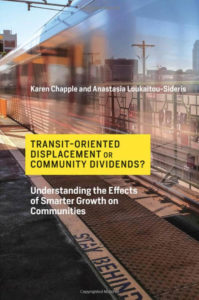 Transit-Oriented Displacement or Community Dividends? Understanding the Effects of Smarter Growth on Communities
Transit-Oriented Displacement or Community Dividends? Understanding the Effects of Smarter Growth on Communities
By Karen Chapple and Anastasia Loukaitou-Sideris
Excerpts from a review in the Journal of the American Planning Association by Adam Millard-Ball, associate professor of environmental studies at the University of California, Santa Cruz. Get this book free as a PDF via Open Access at MIT Press (direct link, 98.7 MB)
“In the early years of transit-oriented development (TOD) in the United States, simply getting a project completed was achievement enough. As TOD has become mainstream, however, concerns have multiplied over long-overlooked equity impacts. In many neighborhoods, community activists now see new rail stations and associated TOD as instruments — unwitting or not — of gentrification and displacement. In contrast, some market-oriented urbanists focus on increasing the supply of housing and are skeptical if not dismissive of equity concerns.
“The evidence to inform this contentious debate has been remarkably thin. Transit-Oriented Displacement or Community Dividends? Understanding the Effects of Smarter Growth on Communities by Karen Chapple and Anastasia Loukaitou-Sideris is therefore a welcome contribution to research and policy on TOD and equity. Though recognizing that TOD reduces vehicle travel and climate pollution, the authors focus attention on its potential ‘dark side’ (p. 1) for low- income households and identify the mechanisms through which TOD might lead to inequitable outcomes.
“Chapple and Loukaitou-Sideris address head-on the central conundrum: To ignore low-income neighborhoods of color perpetuates disinvestment. But to invest in them through better transit, walkable streets, or the amenities that accompany TOD risks exacerbating gentrification and displacement pressures.
“Displacement, however, is hard to conceptualize and measure. One of the book’s major strengths is its careful attention to operationalizing what displacement means on the ground. For example, displacement might not force residents from their homes but would be ‘exclusionary’ if low-income residents are priced out of a neighborhood and never have the opportunity to move in.
“The empirical chapters mobilize a range of quantitative and qualitative evidence across two metropolitan regions: the San Francisco Bay Area and Southern California… Overall, the book is a showcase for mixed methods research, and the depth of evidence that supports the conclusions is exceptional.
“So what does this mean for planning? The book details numerous policies to promote equitable TOD, including rent control and inclusionary housing requirements, along with numerous examples of cities that have implemented each policy.
“An alternative approach, floated in the conclusion, would be to focus TOD in the most affluent communities, which todate have used their political clout to zone out new development.
“Promoting equitable development and avoiding displacement require action across a region, not just in transit-oriented neighborhoods.”
About the review
Reviewer Adam Millard-Ball is an associate professor of environmental studies at the University of California, Santa Cruz. An economist, planner, and geographer, he writes about urban sprawl, transportation, and climate change policy
The full review appears in the First Quarter 2020 issue of the Journal of the American Planning Association, available to APA members for $48/year (print and digital); $36/year (digital only); available free (digital only) for Student APA Members.
About the book
Transit-Oriented Displacement or Community Dividends? Understanding the Effects of Smarter Growth on Communities (MIT Press, April 2019). 368 pages. 68 b&w illus. $40 (paperback) ISBN: 9780262536851
Karen Chapple is Professor of City and Regional Planning and Carmel P. Friesen Chair in Urban Studies at the University of California, Berkeley.
Anastasia Loukaitou-Sideris is Professor of Urban Planning and Associate Provost for Academic Planning at UCLA.

